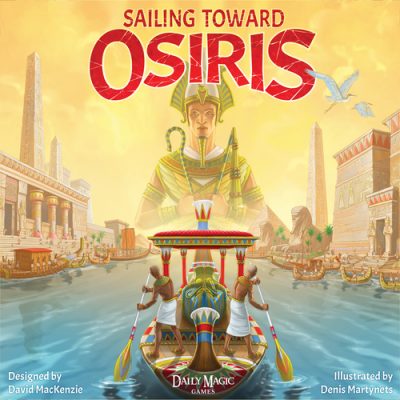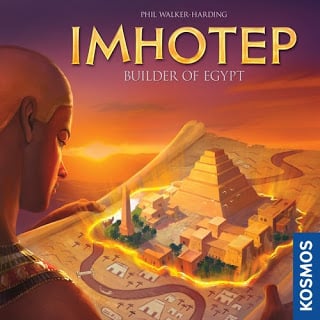On the game table today: two new games with Egyptian themes!

The Pharaoh has passed on, and is making the long journey down the Nile to his permanent resting place. Once he reaches here, he will stand before Osiris and be judged. Unfortunately for him, he produced no heir, so the local governors must build monuments to memorialize his glory. This task isn't altruistic though. The governors know that whoever pays the greatest tribute to their fallen deity will become to the new pharaoh. This is Sailing Toward Osiris, is a game for 2 to 5 players, age 14+. It takes between 60 and 90 minutes to play and can be yours for a Kickstarter pledge of $56 Standard or $66 Deluxe.
Daily Magic Games has a strong history of light to medium weight Kickstarter projects with great art and quality art/components. Therefore, that's exactly what I expected from this game. Well, I was wrong . . . in a good way. The art and component quality are still top notch (I was blown away by just the prototype!) but the game has a bit more depth and meat to it. You have ten different actions you can take on a given turn . . . TEN! This creates a difficult decision every turn you take. There's a Master Laborer in the Labor Pool; do I hire him before my opponent does? What about my Boon Cards? There is one I can play this turn, but I want to do other things first, but if I do those things first someone else might play that Boon Card so I can't. ARG! And then there's the City Cards. I need a new city card, but then I have to give one to my opponent. I want both cards. Which one do I pick? I don't want to give this other card to my opponent! So many good difficult decisions can lead to analysis paralysis, but they also make for an excellent game.
Another aspect I love about this game is the way it scales. There are plenty of games out there that play two to five players. Very few of them play every player count well. This game plays just as well at two players as it does at five players. From the starting number of resources to the amount of spaces available at different player counts, the game designer (W. David MacKenzie) has done an outstanding job to ensure that every player count not only works, but works well. The only thing I would say that doesn't work as well at a two player count would be haggling, because it feels a bit like a zero-sum game, but my game group didn't haggle much at higher player counts the first couple of games anyhow.
The last thing I would like to praise about this game is the theme. I love Egypt, and I hope to visit there one day, so with this theme, I was going to eventually want to try this game. It was just lucky for me that I got to try it early on. From the meeple shapes, to the cartouches on the board, to the actual journey that the barge made, everything immersed you into the game and also provided you a sense of history. This is a great game with a simple depth to it that will bring you back time and time again. Highly recommended!
Learn more about how to set up and play the game.
[tweet "Fans of all things #Egyptian will enjoy these 2 new #boardgames. Review by @StuartsStudy"]

The 2016 Spiel des Jahres (Game of the Year) was a hotly contested battle with three very fun games - Codenames, Karuba, and Imhotep. Codenames ended up winning, but the other two were equally worthy in the discussion. I have already reviewed Codenames and Karuba, so today I would like to tell you about Imhotep. In Egyptian history, Imhotep was the legendary architect responsible for creating amazing structures. In the game, named after him, you and your fellow opponents will take on the role of Egyptian architects. You will try to outsmart and outmaneuver your opponents and carefully contribute to the building of ancient structures. The game plays 2 to 4 players, ages 10+. It takes approximately 40 minutes to play and retails for $40.
Modern board games, particularly Euros, are known for better or for worse as cube pushers. You take a cube, which is supposed to symbolize something, and put it in a spot. The game stereotypically has little theme and bland artwork. Well, at its heart, Imhotep is a literal "cube pusher," because the cube is your main piece. However, the cube is appropriate, because it represents what it is, a building block. Also, these aren't your normal tiny cubes in other games. These are monster cubes, which have both a nice feel in your hands and make for good building pieces, because they don't fall over when stacking. As for the theme, it comes through with some of the sites, particularly the Pyramid and Obelisks, which are built as such. At the other sites, you are just unloading stones, which don't bring the theme out as much.
As for the game play, this is a very simple game with a decent amount of strategy. Do you sail a ship that isn't all the way full, so that you can get the best spots at a site? Or do you maximize the ships and get as many stones to as many sites as possible, even if you don't get the best spot at every site? These are the decisions you have to make every round. If you can get to the Market, you definitely want to pick first, so you can either complete your set or get the rule-breaking cards, which help eliminate one tough decision per round.
The game seems like a simple, family-friendly game, but it can get pretty cutthroat moving ships that people have stones on where you don't or to a place they have no interest in visiting. Because of the nature of this game and the rules, I would say that the ideal player count is three players. At two players, you can basically each focus on two ships and leave the other person alone. At four players, it gets a bit chaotic, feeling like there is no strategy to stone placement, and you'll just end up where you end up. Three players adds the right amount of tension with much less chaos. This was a deserving nominee to game of the year, as it is simple without being able to master it, fun if you don't get your feelings hurt over moved ships, and has a good replay value.
Learn more about how to set up and play the game.
See all the Favorite Games for Family Game Nights reviews here.
Copyright 2017 Stuart Dunn
About the Author

Stuart Dunn
Stuart Dunn was born and raised in Mobile, AL and received a Bachelor of Arts in Psychology and a Master of Business Administration from the University of South Alabama. Stuart reviews all things Catholic including adult books, children’s books, Bible Study series, Catholic Courses, CDs, and DVDs in addition to board games at his blog Stuart’s Study at StuartsStudy.blogspot.com.



.png?width=1806&height=731&name=CatholicMom_hcfm_logo1_pos_871c_2728c%20(002).png)
Comments